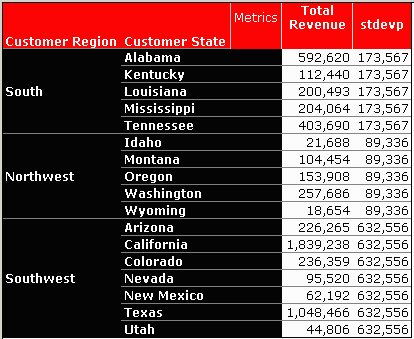Strategy ONE
StDevP (Standard Deviation of a Population)
The standard deviation is a value which shows how widely values in a population differ from the mean. It is useful for comparing different sets of values with a similar mean.
StDevP returns the standard deviation of a population represented by list of values. It is a group-value function.
Syntax
StDevP <FactID >(Argument)
Where:
Argumentis an attribute, fact, or metric representing a list of numbers.FactIDis a parameter that forces a calculation to take place on a fact table that contains the selected fact.
Expression

Usage Notes
- For this function, arguments correspond to an entire population as opposed to a population sample. For population samples, see StDev (Standard Deviation of a Sample).
- When very large population samples are used, this function and the StDev (Standard Deviation of a Sample) function return approximately equal results.
Example
This example shows a report where the standard deviation of the revenue is calculated. This calculation is based on the assumption that the list of values supplied in the metric represents the entire population of the data for which you want to obtain the standard deviation. The calculation is based on the revenue values for each state within a region and calculated at the region level.
Compare this example report to the example for StDev to see the different values returned when calculating for a population as opposed to a sample.
The report contains the attributes Customer Region and Customer State, and the metrics Total Revenue and StDevP. A report filter limits the regions displayed to South, Northwest, and Southwest. The definition of the StDevP metric is as follows:
StDevP([Total Revenue]){[Customer Region], ~}

